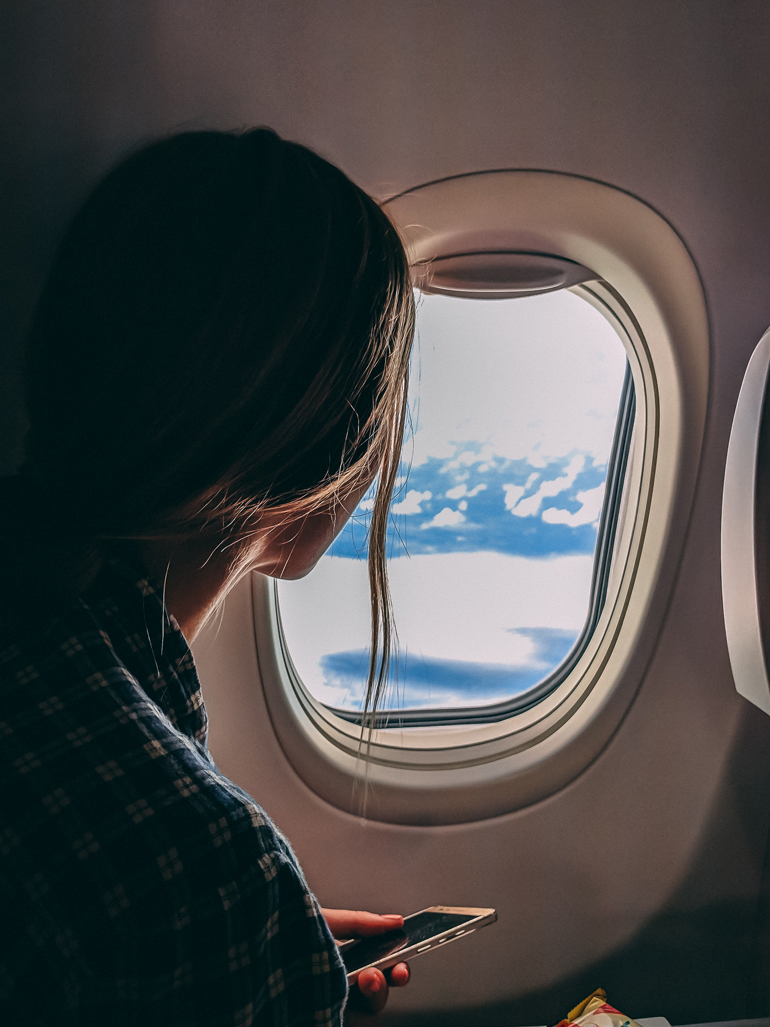Road trips, roller coasters, boat rides — as anyone with motion sickness knows, some of summer’s most enjoyable and quintessential activities are also the most dizzying.
But, why does motion make some people more nauseated than others and what can be done to stop motion sickness and the nauseating side effects, aside from pumping the brakes on summer fun altogether? We asked experts to explain what exactly is happening in our bodies that causes motion sickness and to lend some tips to help make it more bearable so that you can enjoy that road trip, ride that coaster, and not lose your cookies while on a choppy boat ride to a prime snorkeling destination.
Here’s what you need to know about motion sickness, including tips on how to combat the nausea associated with it.
What Causes Motion Sickness?
Motion sickness is generally caused by conflicts among our senses, explains Dr. Edo Paz, M.D. with K Health, a health app that connects you with doctors and can give you an idea of what illness you may have based on your symptoms. That could mean the visual cues you’re getting from your eyes aren’t syncing up with the balance or positional cues you get from your inner ears.
“It is hypothesized that a conflict of these senses in our brain manifests as motion sickness,” Paz says.
While traditional motion sickness happens when your physical sense of motion and your visual sense of motion aren’t on the same page, there is a whole new kind of motion sickness called “digital motion sickness,” explains Dr. Amy Rothenberg, N.D., a licensed naturopathic doctor in Northampton, Massachusetts. This can be caused by virtual reality machines, tablets, phones and computers — the movement is on the screen, and can cause users to feel motion sick despite not being in actual motion.
Common symptoms of motion sickness include dizziness, nausea, and even vomiting in some cases, says Dr. Jaquel Patterson, N.D., a licensed naturopathic physician practicing in Fairfield, Connecticut, and the current president of American Association of Naturopathic Physicians. For other sufferers, it can cause gastrointestinal issues, as well, like a loose stool, she says.

Why Are Some People More Susceptible to Motion Sickness?
The short answer? It’s a bit of a mystery, explains Dr. Nikola Djordjevic, M.D. from MedAlertHelp.org.
“Some scientists believe it’s hereditary, others think this sensitivity can be acquired or eliminated — meaning it’s something you can be trained to overcome,” Djordjevic says. (Think: Figure skaters have figured out tricks like focusing on a piece of the ice when they set into fast-paced twirls).
But, not a lot of research exists on why some people suffer from motion sickness more than others. One study involving nearly 1,500 participants that was published in “Aviation, Space and Environmental Medicine” found that women suffer from motion sickness more than men. Another study found that motion sickness symptoms can worsen when women are in the periovulatory phase of their menstrual cycle, which occurs during the days leading up to ovulation. Children between the ages of 2 and 12 and pregnant women are also more prone to motion sickness, Patterson says.
Motion sickness could also be connected to diet, explains Dr. Rosia Parrish, a licensed naturopathic doctor practicing in Boulder, Colorado. Those sugary funnel cakes at the amusement park or greasy hamburgers on a road trip could indeed be making your motion sickness even worse.
“Eating inflammatory foods including sugar, dairy, soy, gluten, greasy and dried foods can alter the equilibrium of the inner ear because of their associated inflammatory response,” Parrish explains.
Beyond food, though, anything else that increases inflammation could increase your susceptibility to motion sickness, including high altitudes or stress and anxiety, Parrish says.
Now, Try These 7 Expert-Backed Tips to Relieve Motion Sickness
If you’ve suffered from motion sickness, you probably already keep Dramamine on hand or gravitate to the front of a car. But here are a few more strategies to try, according to the experts.
- Drink tea: Specifically, chamomile, mint, and licorice root teas can settle the stomach, Patterson says.
- Give some new technology a try: Wristbands can engage acupressure points, Patterson says, and there is new eyeglass technology that can recreate the horizon to prevent misinformation between the central nervous system and sensory system. Reliefband ($175), for example, uses FDA-cleared technology to prevent motion sickness by using a neuromodulation technology to deliver gentle pulses to the underside of a wrist.
- Try aromatherapy: Both ginger and lavender scents can potentially have calming effects, Patterson says.
- Take supplements: Ginger root and a higher dose of B-6 can help combat motion sickness, according to Parrish.
- Fresh air is best, but next try a vent: Have a vent or fan blowing near or on you if possible — for some it does wonders, Rothenberg says.
- Skip the digital devices, but listen to music: If you’re in motion, digital devices can compound motion sickness symptoms. Instead, Rothenberg suggests, try listening to music or using aromatherapy to engage and distract your senses.
- Know where to sit: If you’re in the car, or on a plane or train, gravitate toward the front, says Paz. For boats, opt for the bottom deck where there is less motion, he says.

Tried-and-Tested Travel Writer Techniques
In addition to speaking with medical professionals, we thought we’d ask travel writers, who spend a lot of time on the go, for their best strategies to ward off and handle motion sickness. Here’s what they have to say:
“Green apples! I don’t usually get motion sick, but I was on a particularly rocky cruise once, and the captain recommended them. The pectin in green apples can neutralize stomach acid.” — Becky Antioco, an Arizona-based travel writer
“I pack peppermint and ginger essential oils and candies, but the only real thing that works for me is to remember to pop a Dramamine before the trip. Staying hydrated, avoiding alcohol, and sometimes simple, bland foods like Saltine crackers can settle my stomach. Texting in the passenger seat will ruin me, so I have my phone set to not get texts when the car is in motion to reduce the temptation.” — Aimee Heckel, editor of TravelBoulder.com
“Many things can help combat or prevent motion sickness, from OTC and prescription medications, to acupressure wristbands and ginger. When on a cruise, though, one factor can help more than any other: location. Try and get a stateroom that is mid-ship (in the middle when looking front to back) and on a lower deck, as close to the water line as possible. This will help ensure that at least when you’re in your room, you’ll experience as little motion as possible, as the center of the ship is the pivot point, whereas the extreme ends and the top travel more. While you’re at it, get a room with a view. A window is great, but a balcony is better. Why? Contrary to what many people think, you actually want to be able to see the water. A major contributing factor to motion sickness is your brain feeling movement but your eyes not seeing that movement. The gift shop on the ship will charge a premium for OTC meds, but they’re often available for free at guest services or in the ship’s medical center.” — Billy Hirsch, who runs cruise information site CruiseHabit.com
“Speak up if you have motion sickness. No one wants to clean up a mess and everyone can understand what it feels like to have an upset stomach. If you say something, people are more than willing to let you sit in the front and roll down the window.” — Lindsay Tigar, freelance travel and lifestyle journalist
 Brittany Anas is a freelance writer who specializes in health, fitness, and travel writing. She also contributes to Men’s Journal, Women’s Health, Trip Savvy, Simplemost, Orbitz, and Eat This, Not That! She spent a decade working at daily newspapers, including The Denver Post and the Daily Camera in Boulder, Colorado, and she is a former federal background investigator. In her free time, Brittany enjoys hiking with her gremlin-pot belly pig mix that the rescue described as a “Boston Terrier” and coaching youth basketball. She also works with domestic abuse survivors, helping them regain financial stability through career coaching. Follower her on Twitter and Instagram.
Brittany Anas is a freelance writer who specializes in health, fitness, and travel writing. She also contributes to Men’s Journal, Women’s Health, Trip Savvy, Simplemost, Orbitz, and Eat This, Not That! She spent a decade working at daily newspapers, including The Denver Post and the Daily Camera in Boulder, Colorado, and she is a former federal background investigator. In her free time, Brittany enjoys hiking with her gremlin-pot belly pig mix that the rescue described as a “Boston Terrier” and coaching youth basketball. She also works with domestic abuse survivors, helping them regain financial stability through career coaching. Follower her on Twitter and Instagram.

